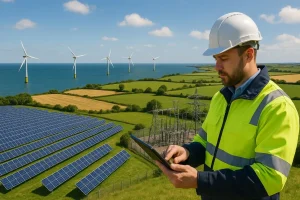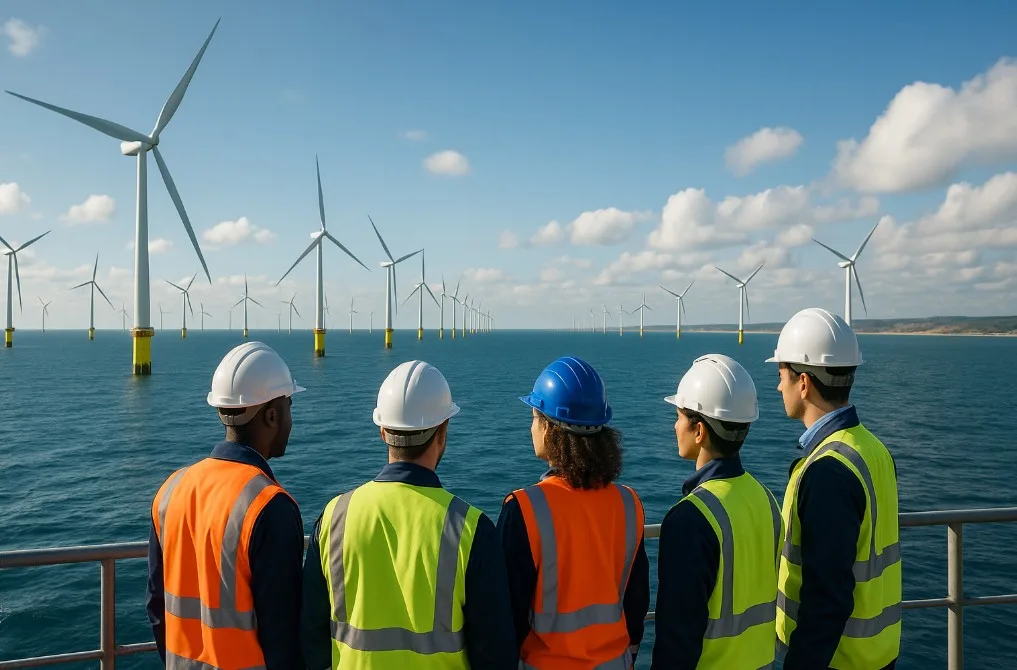Table of Contents
ToggleWhat if the UK could generate affordable, homegrown energy while creating thousands of skilled jobs and protecting households from volatile international markets? This is the ambition behind Great British Energy (GBE), the UK’s new publicly-owned clean power company.
Launched under the Great British Energy Act 2025, and introduced by Energy Secretary Ed Miliband, GBE represents one of the most significant structural changes to Britain’s energy system in decades. Its mission is to develop, invest in, and own clean energy projects across the UK, ensuring that the benefits of renewable power remain in public hands.
At a time when energy bills are under pressure from global fossil fuel prices and the urgency of meeting climate targets is intensifying, GBE is presented as a cornerstone of Britain’s clean energy superpower mission. But how exactly will this new company change the energy landscape, and what will it mean for jobs, communities, and the future of the UK economy?
How Will Great British Energy Put People and Communities First?

Unlike private energy firms that focus on shareholder returns, GBE has been designed to ensure that working people and communities sit at the heart of the clean energy transition. Its focus is not only on generating power but also on ensuring that the financial savings and economic opportunities flow directly to local areas.
Practical examples of this approach are already visible. In March 2025, GBE committed £180 million to install rooftop solar panels on schools and NHS hospitals. These installations are projected to deliver £400 million in savings over 30 years, savings that can be reinvested into education and healthcare rather than being lost to rising energy bills.
Similarly, £10 million in grant funding has been distributed to local authorities across England to roll out clean energy projects for care homes, libraries, and leisure centres. The estimated £35 million in lifetime savings from these schemes will directly benefit communities by reducing public sector running costs.
Scotland, Wales, and Northern Ireland are also benefitting, with devolved governments receiving more than £9.3 million to deliver public sector or community renewable projects. This emphasis on local empowerment highlights a fundamental difference between GBE and private firms: the profits and savings are designed to stay in Britain, reinvested in communities and services.
What Kind of Jobs Will Be Created by Great British Energy?
The clean energy transition is often discussed in terms of climate targets, but for the UK workforce, it represents a profound opportunity for job creation. GBE has been established not only as an energy producer but also as a job creator and skills builder.
The company is set to invest heavily in offshore wind, solar, hydrogen, and other renewable sectors, creating demand for engineers, technicians, project managers, supply chain specialists, and researchers.
For instance, the partnership between GBE, the government, and The Crown Estate has already channelled £1 billion into offshore wind supply chains, supporting thousands of skilled, well-paid jobs across the UK.
GBE’s CEO, Dan McGrail, has made it clear that the company’s role is to act as a green growth engine for the economy. By committing to £1 billion in domestic supply chains, GBE expects to unlock billions more in private capital. The knock-on effect of this investment is a surge in demand for British workers across multiple industries, from steel production to advanced energy storage.
For the younger generation, GBE also signals an expansion of training opportunities and apprenticeships in renewable technologies, ensuring that the workforce is equipped to thrive in the low-carbon economy of the future.
How Will Great British Energy Deliver Clean Power Projects?
GBE is not simply a funding body; it has been tasked with acting as a developer, investor, and owner of renewable energy projects. This gives the company greater control over outcomes and ensures that public interests are safeguarded.
Already, around £200 million has been invested in solar and renewable projects on public buildings, with solar panels delivering tangible reductions in energy costs for schools and hospitals. These projects not only cut carbon emissions but also free up resources for vital frontline services.
GBE’s remit extends across the UK and includes collaboration with devolved governments, local councils, and community energy groups.
This broad approach ensures that renewable projects are not concentrated in only a few regions but are distributed in a way that supports local economies. For example, care homes in England, libraries in Scotland, and leisure centres in Wales are all benefitting from locally tailored schemes.
How Does Great British Energy Strengthen the UK’s Energy Security?

For decades, the UK has relied heavily on imported fossil fuels, leaving households vulnerable to international price spikes. Recent global events have highlighted just how fragile this dependency can be. GBE seeks to reduce this risk by dramatically increasing the supply of homegrown renewable energy.
The company will achieve this by scaling up offshore wind farms, expanding solar deployment, and supporting emerging technologies such as hydrogen and tidal energy. By diversifying the energy mix, the UK will not only cut carbon emissions but also secure a more reliable and stable energy system.
In practice, this means that services like hospitals, schools, and care facilities are less exposed to external shocks. For example, solar panels already installed on NHS hospitals mean that energy-intensive facilities are protected from sudden increases in gas prices, helping budgets go further and ensuring resilience in public service delivery.
What Are the Government’s Objectives for Great British Energy?
The government has outlined three key priorities for GBE, which serve as a framework for its operations. These are:
- Investment in clean technologies: Building capacity in both new and established renewable energy assets.
- Strengthening domestic supply chains: Supporting industries across Britain to ensure economic resilience and sustainable growth.
- Community energy development: Backing local power schemes so that communities benefit directly from the clean energy transition.
GBE has been instructed to produce a Strategic Plan within six months, setting out how it will meet these expectations. Furthermore, the company has been given a financial target: by 2030, it must become self-financing. This means it must generate enough commercial returns to sustain its operations, while reinvesting profits into further clean energy expansion.
This approach is designed to protect billpayers permanently, ensuring that the financial benefits of renewable energy are not temporary but embedded into the structure of the UK’s energy system.
How Does Great British Energy Compare With Private Energy Firms?
The difference between GBE and private energy companies lies in ownership, priorities, and outcomes. While private firms often focus on generating profits for shareholders, GBE reinvests any returns directly into public projects.
| Feature | Great British Energy | Private Energy Firms |
| Ownership | Government-owned | Shareholder-owned |
| Profits | Reinvested in public projects | Distributed as dividends |
| Focus | Affordable, clean, homegrown energy | Profit maximisation |
| Energy Security | Strengthens national resilience | Exposed to global market fluctuations |
| Community Impact | Local savings and reinvestment | Limited local reinvestment |
This distinction is not only theoretical but practical. A private company might install solar panels with the goal of profit, whereas GBE installs them to reduce long-term costs for schools and hospitals, freeing resources for public services.
What Challenges and Opportunities Lie Ahead for Great British Energy?

No initiative of this scale comes without challenges. One pressing issue is the shortage of skilled workers in renewable energy industries. To meet its targets, GBE will need to expand training programmes and collaborate with universities, colleges, and apprenticeships to ensure a steady supply of qualified workers.
Another challenge is the risk of political changes. Publicly-owned companies are often influenced by shifts in government policy, which could affect funding or strategic priorities. For GBE to succeed, it will require stable, long-term support that transcends party politics.
However, these challenges bring with them opportunities. The need for a skilled workforce creates demand for new training centres and courses, which in turn create jobs. Political scrutiny could also drive transparency and accountability, strengthening public trust in the model.
What is the Long-term Vision for Great British Energy?
Ed Miliband has been clear that GBE should act as a national champion for renewable energy. His vision is that Britain should “make things and own things again,” using its abundant natural resources to power the economy and create prosperity.
The long-term vision includes:
- Delivering a self-financing, publicly-owned clean energy system by 2030.
- Creating thousands of skilled jobs across renewable industries.
- Protecting households from volatile energy costs.
- Securing Britain’s role as a global leader in renewable technologies.
The foundations are already being laid. From community solar schemes to billion-pound offshore wind investments, GBE is beginning to demonstrate what a publicly-owned energy company can achieve.
Conclusion – Can Great British Energy Transform Britain’s Future?
The launch of Great British Energy is not merely about generating electricity; it is about reshaping the UK’s economic and social landscape. By investing in renewable power, creating jobs, and keeping profits in public hands, GBE represents a departure from the profit-driven models that have dominated the energy sector for decades.
If the company meets its ambitious targets, it could play a defining role in delivering a secure, affordable, and sustainable energy future for the UK. More importantly, it could prove that clean energy and jobs from publicly-owned Great British Energy are not just political slogans but practical realities, powering communities and protecting households for generations to come.
FAQs
How will Great British Energy lower household bills?
By investing in homegrown renewable projects, GBE reduces reliance on imported fossil fuels, stabilising prices and cutting long-term costs.
Will Great British Energy operate across the UK?
Yes. The company is working with devolved governments to deliver renewable projects in England, Scotland, Wales, and Northern Ireland.
What technologies will GBE prioritise?
GBE will focus on offshore wind, solar, hydrogen, and innovative renewable technologies, while also supporting nuclear partnerships.
How much investment has already been made?
Around £200 million has been directed into solar and renewable projects on schools, hospitals, and public buildings.
When will Great British Energy become profitable?
The government has set a target for the company to become self-financing by 2030, reinvesting all profits into further clean energy.
How will GBE create jobs?
Through large-scale renewable projects, expansion of supply chains, and investment in skills training and apprenticeships.
What makes GBE different from private firms?
Unlike private firms, GBE is publicly-owned, reinvests profits into communities, and prioritises affordability and national energy security.




